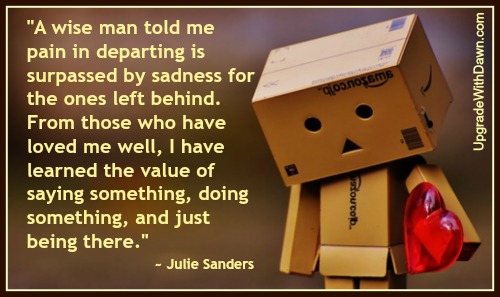Julie Sanders has a special gift for helping people find peace in their lives, work, relationships and family. In this Relationships UPGRADE, she helps us find peace during the transitional separations in our lives.
 "When it comes to leaving," Julie says, "life includes an equal portion of arrivals and departures. How can we deal with departures and help both who leave and those left behind?
"When it comes to leaving," Julie says, "life includes an equal portion of arrivals and departures. How can we deal with departures and help both who leave and those left behind?
I (Dawn) moved many times in my lifetime. I know the pain of separation and the process of change. I wish I'd had Julie's good advice back then!
Julie continues . . .
Sometimes separation results from our decisions, and sometimes it’s imposed on us by another. It may be the result of a long process of release, or it may be sudden.
A change in relational routines and familiar life functions may leave us feeling unsettled, insecure, or disoriented.
Since separation includes loss, there may be grieving.
Departures come with job changes, health trials, and life choices. Whether we say goodbye to a family member, co-worker, friend, or pastor, emptiness may seep in where security once lived.
What response lifts up the leaver and the one being left?
1. Say Something
When a significant person leaves, there may be an urge to explain, weigh in, or oppose it. After all, if we have a connection, it will be uncomfortable at best or painful at worst.
Sometimes the only message needed is a silent one: a smile, hug, handshake.
But if the response is audible, it helps to speak wisely. “Let no corrupting talk come out of your mouths, but only such as is good for building up, as fits the occasion, that it may give grace to those who hear” (Ephesians 4:29).
Feelings rise in separations, so it pays to be alert to rotten, poor quality words escaping with emotion.
Whatever the delivery of our talk, messages should be useful, of good quality to “build up” the one leaving and those being left behind.
Positive, true words promote growth in times of transition.
Helpful messages give good will and kindness for hearts churning in change.
If life is upset by a leaving, good words will give good will. Words can give life or death. In a time of change, life is needed, “as fits the occasion.”
You could say nothing, but transition creates space and time where words of life are helpful to release the leaver to the next place and settle those who stay.
Say something, and make it good.
- Put into words how the person influenced you and share it.
- Consider how the person impacted your life in positive ways and state it.
- Think about how you helped each other and say thank you.
- Reflect on how God worked in the moving and affirm His movement.
2. Do Something
No matter if you’re the one going or staying, loss that accompanies leaving creates need.
Whether you chose the departure or find yourself caught up in someone’s choice, do what you can to be the salve in the separation.
Do something practical to meet a present need.
- Is your heart hurting? Spend time talking to God or reading His word for encouragement.
- Is packing needed? Get boxes and help your significant person to do the work.
- Is the pathway unclear? Use your skills and network to help make connections.
- Is the departure having financial impact? Give a gift card or buy lunch.
3. Be There
There’s an undercurrent in separation that feels like rejection. It makes us wonder if we’re being abandoned for better things.
It applies to losing a loved one, seeing a spiritual leader leave, or watching a friend move away. Leaving for more can feel like not being loved anymore. In those times, it’s tempting not to be with the one who prompted the pain to begin with. That’s when it matters just to be present.
God’s path for me has most often assigned me the leaving role, instead of the one staying behind.
In one particular leaving, a wise man told me pain in departing is surpassed by sadness for the ones left behind.
From those who have loved me well, I have learned the value of saying something, doing something, and just being there.
- Be present and be grateful to be together in silence.
- Be present and say something good.
- Be present and do something helpful.
Life includes departures and arrivals in equal measure. As sure as there is coming, there is going.
When those you love let you know it’s time to leave, say something good, do something helpful, and be there.
When it’s hard to let go, what do you think it says about the bond you share? What words could be expressed to lift up the one you are leaving or leaving behind?
 Julie Sanders, from her home in the Pacific Northwest, is in a season of both leaving and being left behind. She is grateful to know God never leaves us, and she believes He helps us be fully present where He has us each day. In July of 2019 Julie will release a devotional guide for moms whose children leave for school, The ABC’s of Praying for Students. Learn more about Julie and her book at http://www.juliesanders.org/.
Julie Sanders, from her home in the Pacific Northwest, is in a season of both leaving and being left behind. She is grateful to know God never leaves us, and she believes He helps us be fully present where He has us each day. In July of 2019 Julie will release a devotional guide for moms whose children leave for school, The ABC’s of Praying for Students. Learn more about Julie and her book at http://www.juliesanders.org/.
Graphic adapted, courtesy of Alexas Fotos at Pixabay.